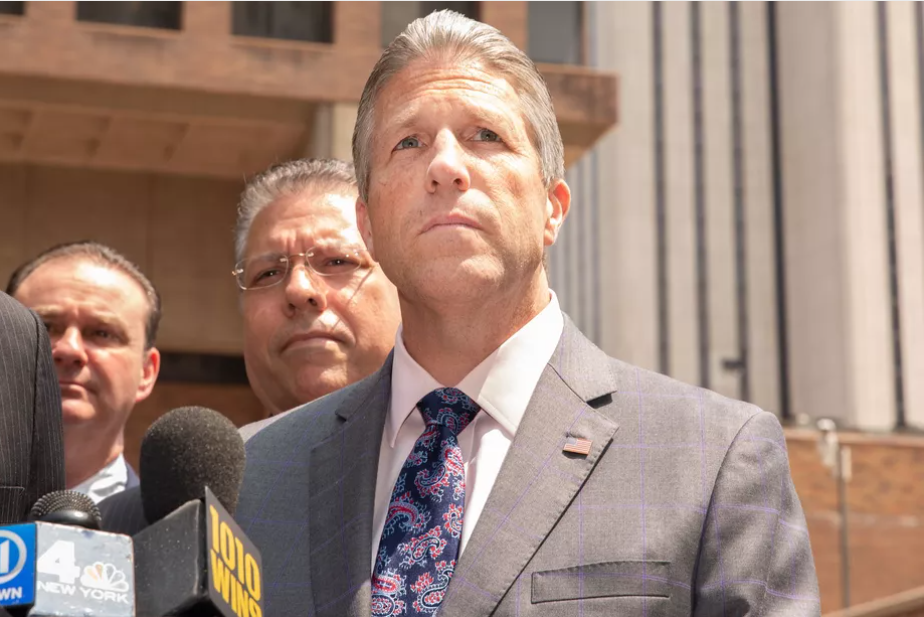By Greg B. Smith

This story was originally published on June 1, 2020 by THE CITY.
With state lawmakers set to consider nixing a law that bars the public release of police misconduct records, the city’s most powerful police union is vowing a war.
And the Police Benevolent Association of New York City isn’t shy about throwing around money to fight its battles — especially in Albany — spending more than $1.4 million on campaign contributions and lobbying fees since 2015, records show.
The union, which represents 24,000 patrol officers, opposes any alteration of Civil Rights Law section 50-a, which city officials say prohibits them from releasing personnel information about cops — including findings of serious misbehavior.
For years, the union has managed to fend off multiple efforts to repeal or water down 50-a.
But the wave of protests sweeping the nation following the death of George Floyd at the hands of a white Minneapolis police officer has unleashed a renewed push to finally end the law or at least amend it to allow for the release of some records.
:no_upscale()/cdn.vox-cdn.com/uploads/chorus_asset/file/20012183/053120_george_floyd_protest_3.0.jpg)
Qualified Support
Over the weekend, Gov. Andrew Cuomo — who has long called any decision on 50-a a mayoral matter — offered his support for reforming the law, while stopping short of backing a full repeal.
Ditto for Mayor Bill de Blasio, who has spoken of loosening 50-a’s restrictions on disclosure over the last two years. On Monday, after THE CITY reported Democratic leaders had taken up the cause with a new urgency, he predicted change would come this month.
“This will be one of the single most important things we can do to increase trust between police and the community,” he said. “We have a moment now that we can get that done.”
Meanwhile, the Senate and Assembly majorities held a videoconference Monday on several pending bills to address law enforcement reforms, including 50-a.
By day’s end, Assembly Speaker Carl Heastie and Senate Majority Leader Andrea Stewart-Cousins put out a statement saying, “We intend to act on [the bills] next week.”
On Sunday, a legislative source said an informal poll of Democratic Senate members showed enough support to approve the repeal of the law, with at least 32 votes in favor of the measure.
That’s even though some of the 40 Democrats in the Senate represent relatively conservative New York City suburbs where considerable numbers of cops reside.
NYPD Blue Spends Green
Whether 50-a is actually repealed or even amended remains to be seen, given that the PBA has, for years, held enormous sway with certain New York politicians.
And the union has hefty resources to maintain that influence.
From January 1, 2015, through this May 13, the PBA’s political action committee wrote nearly $650,000 in campaign checks to a wide variety of New York politicians, with most going to state legislators, according to records examined by THE CITY.
The state Senate Republican Campaign Committee was the biggest single beneficiary, receiving $78,500 between 2015 and 2018 alone.
The union has also spent hundreds of thousands of its members’ dues to hire outside lobbyists — dropping $768,000 from 2017 through 2019, according to filings with the state Joint Commission on Public Ethics. That included a $10,000-a-month retainer paid to the politically connected lobbyist law firm Mannatt Phelps.
The PBA has run multiple TV spots castigating de Blasio for failing to support what union leadership described as a “fair” pay hike for cops. In 2018, the union spent $320,000 on ads alone.
On Monday, John Nuthall, a spokesperson for the PBA, did not respond to questions from THE CITY about how the union decides whom to give political donations to or how it intends to combat the renewed interest in zapping or altering 50-a.
But a statement issued by PBA President Patrick Lynch Sunday makes clear the union isn’t about to budge.
He reiterated the union’s claim that release of any police personnel records would give criminals the ability to target specific cops at their homes — a contention that seems unlikely since the state Freedom of Information Law already bars release of personal information, such as addresses and phone numbers.
Nevertheless, Lynch stated, “It is inconceivable that Governor Cuomo would want to arm those extremists with confidential police personnel records, so that they bring their weapons to our front doors. We cannot protect New York if politicians won’t even provide the bare minimum protections for us and our families.”
Key Obstacle to Reform
The union originally pushed for the law in 1976, amid concerns even then about it serving to hide misconduct.
And each year over the last five years, the bill to repeal 50-a has been proposed and died without passage, despite de Blasio and ultimately NYPD leadership agreeing that the law should be changed.
Supporters of repealing 50-a, including Assemblymember Dan Quart (D-Manhattan), a practicing criminal defense lawyer who’s a co-sponsor on the repeal bill, point to the PBA as the key obstacle to reform.
“There was no progress on this in the legislature in large part because of the PBA’s opposition and its distortions about what repeal would do,” Quart said. “Their scare tactics about vigilantism against police officers are simply not true.”
And it didn’t help supporters of repeal that de Blasio has been more talk than action on reforming 50-a. While the mayor has said for two years he wants to reform the law, neither City Hall nor the NYPD has actually drafted a bill.
“We should have gotten it done many Junes before,” said Quart, who plans to run to replace Manhattan District Attorney Cyrus Vance. “I haven’t seen any evidence in the last six years in Albany that the mayor has made any effort to repeal or, in his words, reform 50-a.”
Officers’ Safety Cited
De Blasio and the NYPD back a limited alteration of 50-a that would allow only for the release of records related to what they call “serious police misconduct” that has been formally substantiated via the existing NYPD disciplinary process.
Freddi Goldstein, a de Blasio spokesperson, said the mayor wants to “lose the restrictions on release but have a law in place that maintains the safety of the officers.”
Officers currently can be charged with serious misconduct, face a formal hearing, and be found to have violated NYPD regulations all virtually out of public view.
While the public can attend the hearing, the formal complaint, any evidence entered, the NYPD judge’s opinion and the police commissioner’s ultimate finding are supposed to be kept private due to 50-a.
The enforcement of this prohibition has been sporadic. For years, the NYPD would allow reporters to review bare-bones information about substantiated misconduct.
But in 2018, the city Law Department ended this practice, deciding it violated 50-a.
:no_upscale()/cdn.vox-cdn.com/uploads/chorus_asset/file/20001881/4e3945cbf165e0ae5e56b10a851e62b1f867.jpg)
The only recent exception was the finding of misconduct against Staten Island cop Daniel Pantaleo, who was charged with putting a fatal chokehold on Eric Garner in 2014.
In August 2019, then-Commissioner Jimmy O’Neill took the unusual step of revealing the NYPD judge’s finding that Pantaleo had used an illegal chokehold on Garner. The commissioner then announced that he was firing Pantaleo.
At the time, the PBA blasted him for making his decision public.
This story was originally published by THE CITY, an independent, nonprofit news organization dedicated to hard-hitting reporting that serves the people of New York.



































